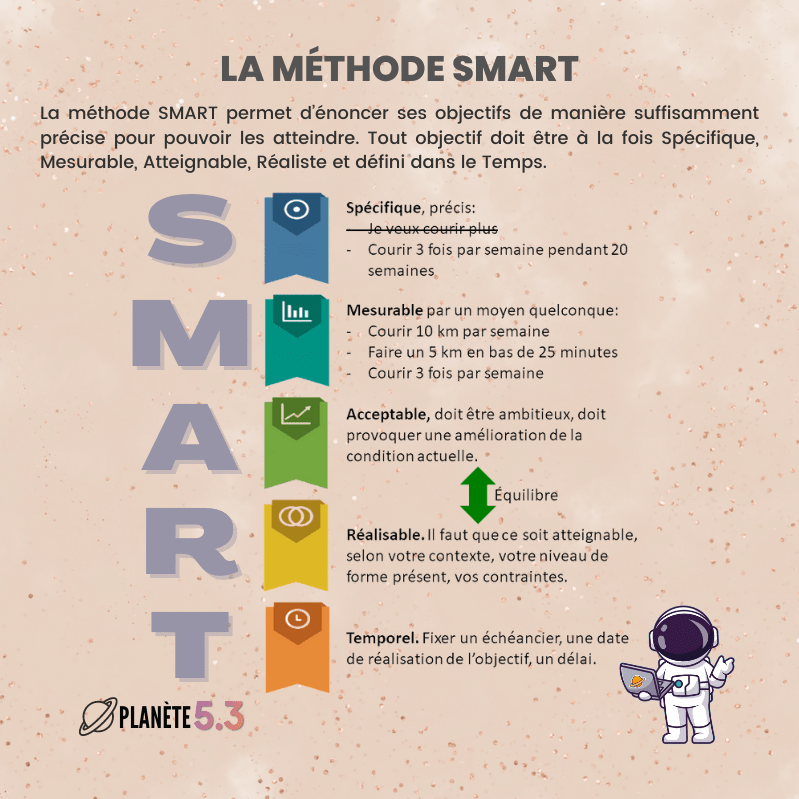Big or small, the goals we set contribute directly to our well-being. They give both meaning to our actions and a raison d’être to our ego. In fact, setting goals helps the individual to go in the direction he has chosen. But, be careful, that doesn’t mean blindly ignoring the possibilities of failure.
The objectives that we set ourselves must be able to interest us as much as they mobilize us. Once reached, they will give us a sense of accomplishment. Setting goals is showing that you have confidence in the future : it is a fundamental element to be happy.
Goals build confidence
We need goals to motivate us, but they must follow two laws: be ambitious enough to excite us, and realistic enough to not cause unnecessary stress.
Objectives can be defined as the materialization of our valeurs and the realization of our dreams. Researchers have shown that planning and achieving goals can contribute to happiness in a variety of ways, including:
- Be a source of interest, engagement or pleasure
- Giving meaning to our actions, activities and behaviors.
- Generate a feeling of accomplishment when they are achieved (it is good to break them down into successive stages).
- Build self-confidence and optimism about the future.
Goals help focus our attention. Working hard to achieve them seems to be as important to well-being as achieving them.
Goals are more successful when they correspond to something we really want to realize ourselves rather than when they are imposed on us (by a third party or by the boss).
All objectives are not equal, they can be of various importance:
- Long-term : a big life or career goal such as becoming a doctor, starting a business or starting a family.
- Short term : to be carried out in the weeks or months to come, such as organizing a big party, going on a distant trip, going back to sport or taking a training course.
- For the same day (or the next day): cook an original dish, prepare a presentation, go to the gym or contact an old friend.
Optimistic but realistic goals
It should be noted that the way we set a goal directly influences the actions we will take to achieve it, the efforts we will make and the perseverance we will show.
Optimism is believing that things are more likely to turn out well rather than the other way around. So how do you take an optimistic approach when setting goals?
- First, set goals that lead us to something positive rather than those that allow us to avoid what we don’t want.
- Next, be proactive when problems arise instead of ignoring them hoping they will go away on their own.
- Avoid dwelling on the negatives and accept the things we cannot change, even if it means readjust our objectives.
- Taking a realistic but optimistic view of outcomes seems to increase the likelihood of things going well. But it takes keep your feet on the ground. Being optimistic does not mean resolutely ignoring the possibilities of failure. Having unrealistic expectations is often counterproductive. This can lead to great disappointment and even discouragement.

This text is taken from the mini-program 10 Small Happiness Steps which offers you to receive an Email every morning for 10 days! It’s 100% free…
Click here to register and increase your well-being capital
Set goals to move forward
The goals we set are sources of motivation when they are modest and reasons for being when they are ambitious.
As they give meaning and direction to our actionsthey nurture personal satisfaction and a sense of accomplishment, two essential notions of well-being.
I encourage you to break down your goal into small successive steps : challenges to overcome or daily tasks to accomplish in order to stay the course. It makes your goal more readable, more concrete and, in the end, easier to achieve.
The right questions to ask yourself from the start will seem obvious to you:
- What do I want to do or achieve and what is my end goal?
- When do I want to achieve it and how will I know that I have achieved it?
- How can I make my goal more accessible by breaking it down into sub-goals?
Then you will have to reward every time you take a step. Rewards and actions are closely linked because when we make an effort, we always expect a small gift or, at least, compensation.
Each time we receive a reward, the brain releases dopamine, which creates a feeling of pleasure. This hormone is very addictive, which will encourage you to continue to secrete even more. As you will see, this search for satisfaction will maintain your motivation.
Do not forget that every small step is a victory !
So what goal do you have in mind for today, for the three weeks or for the next three years?
Post your comments in our Facebook group












